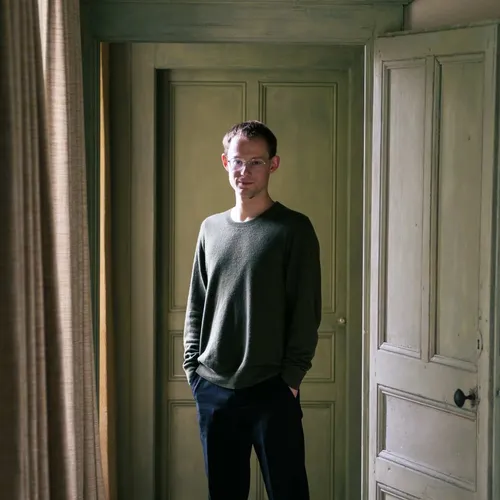
Quickly emerging as a leading young American composer, Miles’s works for orchestra, voice, chamber ensembles, and solo piano have been commissioned and performed in a growing number of countries around the world, including the U.S.A, the U.K, Germany, Switzerland, Italy, the Czech Republic, and Australia.
Miles’s Fantasy for piano solo (2024), a three-movement, 25-minute work commissioned by the Venice Biennale for Bertrand Chamayou, was recently hailed as “evoking the young Messiaen” (Classica) and as “one of the most refreshing piano compositions one has heard in recent times.... Don't forget this name” (Scherzo).
Miles’s music has been broadcast on BBC Radio 3 and RAI Radio 3, and has been commissioned and performed by ensembles including the London Symphony Orchestra, Orpheus Sinfonia (UK), Aspen Chamber Symphony, Classeek, Argento Ensemble, Lontano Ensemble, New York Virtuoso Singers, Merz Trio, Linos Trio, and Yale Percussion Group. He has additionally received recognition from BMI and the American Academy of Arts and Letters, and has been granted residencies and fellowships in composition at the Aspen Music Festival (USA), the Biennale di Venezia College Musica (IT), and the Festival d’Aix- en-Provence (FR). Last season, he was the Classeek Ambassador Programme’s 2024/2025 composer, selected from an open call.
In equal demand as a performer, Miles appears regularly in the US and Europe and performing in venues including the Kaufman Center, DiMenna Center, and Carnegie Hall. A dedicated new-musician, he has premiered over fifty pieces by his peers, students, and mentors alike, including works by Aaron Jay Kernis, Georg Friedrich Haas, and Han Lash, additionally working with Martin Bresnick, Marcos Balter, Chaya Czernowin, Unsuk Chin, and many other composers on performances of their music. An avid chamber musician, he has collaborated with artists and ensembles including Rolston and Isidore Quartets, Cantata Profana, icarus Quartet, Orchestra New England (world-premiere Ives recordings on Naxos), Argento Ensemble, New York Virtuoso Singers, choreographer Jennifer Jancuska (Hamilton) & the BringAbout, New Chamber Ballet, and Mark Morris Dance Group. Miles has also been heard at festivals/institutions including Norfolk (US), Bowdoin, Pianofest in the Hamptons, Apple Hill Center for Chamber Music, and IMS Prussia Cove, where he participates in Open Chamber Music. Committed to an eclectic and wide- ranging performance practice beyond classical music, he plays frequently and fluently in numerous non- and semi-notated styles, in- and outside the concert hall.
Born and raised in rural New Hampshire, Miles holds a BA and an MM from Yale, where he studied with Wei-Yi Yang (Piano) and Martin Bresnick, David Lang, Christopher Theofanidis, and Aaron Jay Kernis (Composition). Upon graduation, he received the 2020 Dean’s Prize, Yale School of Music’s highest excellence award (conferred annually on a single graduating student, from any discipline). Miles additionally holds a piano degree from the Musik-Akademie Basel, where he studied with Claudio Martínez Mehner. In composition, Miles is presently a doctoral student of Sir George Benjamin.
My Fantasy for piano solo borrows a name from Schumann, but very little from his language. It does, however, trace the Schumann Fantasie’s formal arc: a first movement spun out of a tiny fragment of quoted song, which refuses to cadence until its closing phrase; a roving, easily- distracted second movement, which reaches manic levels of activity before shattering; and finally —out of the aftermath—a somnolent, dream-world final movement which, weaving together fragments, finds hard-earned peace. The Fantasy was written for the fantastic Bertrand Chamayou, who premiered it at the Venice Biennale 68th International Festival of Contemporary Music in late 2024.
The first movement is built in long spans which refuse to cadence, but gradually trace the outlines of a pitch-world, folding into a hazily-recognizable form. The figuration is constant and watery. (I wrote this movement with Bertrand’s playing especially in mind—in great admiration of his Ravel recordings.) The movement ends elliptically, having set forth centricities and formal phenomena which will have ramifications throughout the piece.
The second movement, “Dances”, features different kind of dance clamoring to interrupt and interact with each other—different ways of animating very similar pitch spheres. Abstract jittery music feints in the direction of dance, followed by a sort of arhythmic soft-shoe, before direct stylistic nods come into play—a fast, lilting waltz; bit of New Orleans stride with unpredictable accent patterns; a rapid, raucous salsa with prominent clave. The interruptions are playful, but the pacing is ferociously controlled: in the end, everything careens into a climax which encompasses the whole keyboard.*
The final movement, “Lullabies”, finds peace. To weave its way, it borrows some tunes from my alter-ego project, Ave redactor. Each borrowed fragment originally bore words of some peculiar meaning (to me); each is in a sense a lullaby, and one of them, indeed, refracts a very, very famous lullaby. None of these cradle-songs end conclusively: through them, though, there is a new synthesis of the pitch languages of the piece, and a pathway toward the beginnings of some fresh dream: a gently-rocking, misty stasis.